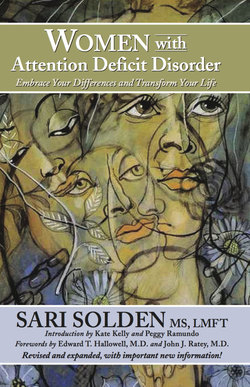Читать книгу Women With Attention Deficit Disorder: Embrace Your Differences and Transform Your Life - Sari Boone's Solden - Страница 6
ORIGINAL INTRODUCTION by Peggy Ramundo and Kate Kelly
ОглавлениеDear Readers,
When Sari sent us her completed manuscript for review, we were honored and delighted that she had asked us to write an introduction to this important new book.
When we began writing You Mean I’m Not Lazy, Stupid, or Crazy?!, there were no books available written specifically for ADD adults. Because there was so little written information out there, we felt compelled to attempt the impossible - to create an encyclopedia of ADD!
With such a huge task in front of us, the writing process seemed to go on endlessly. But we did manage to complete the book after more than two years of effort. The book was not finished as quickly as Kate would have liked, nor did it fit Peggy’s idea of perfection.
However, we managed to produce a fairly comprehensive self-help guide for ADD adults. Still, we knew that there was so much we had yet to learn about ADD and so much that we didn’t have time or space to address.
Although we are women with ADD, we did not address women’s issues in any depth in our book.
Sari has used her personal and professional experience to shine some light into the dark closet inhabited by far too many ADD women; a closet of shame and despair and invisibility.
Women’s voices have not been heard loudly enough in the world of ADD, reflecting women’s situation in society at large.
We do not intend to dishonor the valuable contributions made by men to the field of Attention Deficit Disorder. But we feel that understanding of ADD has been hampered and dominated by a tendency to rely too heavily on objective means of viewing it.
As Belenky et.al, (1986) found in their massive study of women’s intellectual development, experiential and subjective learning is an important step in women’s developmental process. In comparable studies with male subjects, the subjective piece was noticeably lacking.
ADD is a complicated disorder that does not fit neatly into the usual diagnostic boxes. Trying to describe it in terms of the three classic symptoms of hyperactivity, impulsivity and inattention gives us a one-sided and overly simplistic view of the problems faced by persons with ADD.
Too much of the available literature is written from the standpoint of the ADD expert looking at the disorder from the outside.
And the view from the outside tells only part of the story. ADD is a subtle handicap that can impact in ways we are just beginning to understand.
When we were first exploring the impact of ADD on our own lives, there was almost nothing known about ADD in adults. We had to read the child literature and extrapolate mainly from accounts of hyperactive boys. It was a starting point, but it did little in terms of helping us to make sense of our experience as ADD women.
We found that the personal stories of other ADD adults provided the missing puzzle piece that made a more complete picture of our own lives and struggles.
Sari has taken this perspective a step further in her book. She empowers ADD women by validating their experience as worthwhile human beings who struggle with serious organizational problems in many areas of their lives. She illuminates the heavy burden placed on the shoulders of ADD women, who face additional demands for organizational skills by gender role expectations imposed by our culture.
Girls and women with ADD have been socialized to suffer their problems in silence. Or at least in a quieter version than that of the classic picture presented by AD/HD boys and men. Hyperactive girls learn to either inhibit their behavior to an unnatural degree or suffer the consequences of being labeled as unfeminine. And those who have ADD without hyperactivity fade into the background.
The problems of ADD women are often trivialized or dismissed. Because they are hidden, locked up in a closet of shame.
Do not be misled by the title of this book. It is not merely another self-help book on how to get organized. There are practical suggestions for dealing with the concrete messes of women’s lives, but the heart of the book deals with the much larger issue of the impact of chronic disorganization on all facets of life.
The “messy closet” is a metaphor for a brain that is locked up and hidden because its owner is overwhelmed by the chaos of too many expectations and the inability to sort and prioritize them.
By sharing her personal experiences and those of her clients, Sari will help countless women begin to acknowledge and wrestle with the crippling shame that prevents their emergence from that dark closet.
Kate Kelly and Peggy Ramundo are the co-authors of the classic ADD adult books, You Mean I’m Not Lazy, Stupid or Crazy?!, and The ADDed Dimension. Kate is an advanced practice psychiatric nurse and Peggy is a professional educator. Both Peggy and Kate have worked professionally with ADD adults for more than a decade. Currently, they both practice as ADD life-coaches. Their most valuable credential, however, is that they have learned to live and love successfully as ADD adults. Visit them at their website – www.addcoaching.com
Peggy Ramundo and Kate Kelly
